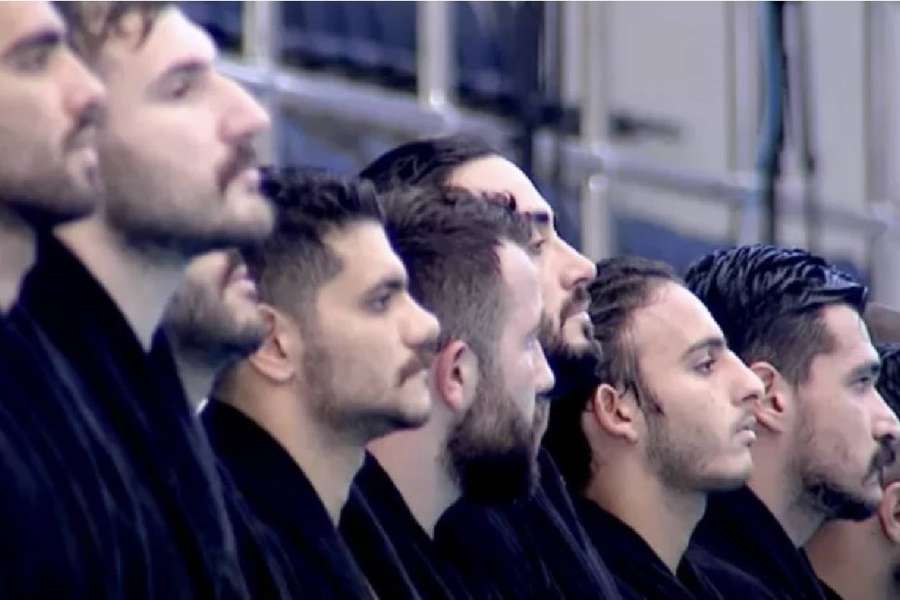Silent Iranian water polo players latest athletes to signal support of government protests

Videos posted on Twitter showed the team not singing as the Iranian national anthem played at a match against India in Bangkok on Tuesday.
Reuters could not verify the video clips but social media users saw the refusal to sing as a clear show of support for the eight-week-old protests, the biggest challenge to Iran's clerical leaders since the 1979 Islamic Revolution.
"One of the most radical acts by the Iranian national water polo team. We know sport teams that have sided with the people and we appreciate your support," said one an unverified Twitter user.
The anti-government demonstrations erupted in September after the death of a Kurdish woman Mahsa Amini, who had been detained by morality police for allegedly flouting the Islamic Republic's strict dress code imposed on women.
The protests quickly turned into a popular revolt, with people ranging from students to doctors to lawyers to workers to athletes taking part.
The Basij militia and other security forces have cracked down hard on the unrest but protesters are sticking to their demand for an end to hardline Islamist rule under Supreme Leader Ayatollah Ali Khamenei.
On Wednesday, shopkeepers in some Kurdish cities went on strike to show their respect for dozens of people who were killed in the town of Zahedan on September 30th, Kurdish rights group Hengaw said.
Amnesty International said security forces killed at least 66 people there. Authorities in Zahedan sacked the police chief and the head of a police station near where the killings took place.
Shopkeepers in the market town of Valiasr in Tehran province also closed their businesses to mark the 40th day since the killings took place, according to HRANA news agency.
The water polo team's unwillingness to sing was not the first time that Iranian sports people have taken actions that have been widely interpreted as gestures of support for the protests.
OTHER ATHLETES' PROTESTS
Last week, Iran’s national beach soccer team players refused to sing the national anthem at the beginning of a semi-final in a championship against the United Arab Emirates in Dubai.
Then on Sunday, the beach soccer team players did not cheer or celebrate after defeating Brazil to win the championship, the activist account said.
One Iranian player even celebrated his goal by pretending to cut his hair, a gesture of protest by Iranian women, who have been at the forefront of the protests.
The Iranian beach football federation said in a statement on Monday the players' actions were “unwise”.
Another Twitter user, identified on the site as Mehdi Andarziyan, a PhD student, chided authorities for not quickly stamping out dissent, saying:
"Mr Minister of Sports, if you had slapped the beach soccer players, the water polo players would not have disrespected the anthem of the Islamic Republic!"
On Sunday, skater Niloufar Mardani performed without a headscarf in a competition in Turkey. She later published a video shared on Telegram accounts, which Reuters could not verify, that show her apologising.
The footage explains that she participated independently in Turkey in the skating tournament at her own expense and that she did not see that her veil had fallen off when she took off her helmet, which is required while appearing on the prize podium.
She also appeared without her veil away from the podium.
Mardani said her story was manipulated by "foreign media".
Iran's sports ministry said Mardani did not get its authorization to participate in the event in Turkey. It criticized her action and said has not been part of the national team since last month.
THE CONTEXT
In October, Iranian climber Elnaz Rekabi caused a stir by competing in an international contest in South Korea without a headscarf, a requirement for female athletes representing Iran in all sports.
Rekabi later apologised for the "turbulence and worry" and said poor timing had led to her competing without her hijab.
More than 1,000 people have been indicted in Tehran Province alone in connection with what the government calls "riots".
The activist HRANA news agency said 321 protesters had been killed in the unrest as of Monday, including 50 minors.
Thirty-eight members of the security forces had also been killed, it said.
State media said last month that more than 46 members of the security forces, including police officers, had been killed. Government officials have not provided an estimate of any wider death count.
